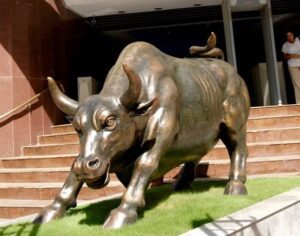Bombay Stock Exchange (BSE)
The Bombay Stock Exchange (BSE), Asia’s oldest stock exchange, holds a pivotal position in the development of India’s capital market. Situated in Mumbai, the financial epicenter of India, BSE offers a platform for trading equities, derivatives, and debt instruments. This article delves deep into the history, structure, and operations of BSE, while examining its impact on the Indian economy and its influence on global financial markets.
History and Evolution of BSE
Founding and Early Years
The BSE originated in 1875 as the “Native Share and Stock Brokers’ Association.” Brokers initially gathered under a banyan tree in front of Mumbai’s Town Hall. Over time, these informal meetings transformed into a formal institution. The government recognized BSE under the Securities Contracts (Regulation) Act, 1956. This recognition marked a significant milestone, propelling BSE into the forefront of Indian financial markets.

Modernization and Technological Advancements
By the 1990s, BSE had undergone substantial modernization. The exchange adopted electronic trading to replace the traditional open outcry system. The introduction of the BOLT (BSE On-Line Trading) system in 1995 marked a revolutionary change. This shift facilitated faster, more efficient trading and enhanced market transparency. Moreover, BSE continued to embrace technological advancements, ensuring it stayed competitive and relevant in a rapidly evolving global financial landscape.
Organizational Structure of BSE
Governance and Management
A well-defined governance structure characterizes BSE. A board of directors, comprising experienced professionals from diverse fields, oversees the exchange’s operations. This board ensures adherence to regulatory standards and the adoption of best practices in corporate governance. Furthermore, the management team executes the strategic vision, ensuring the exchange’s smooth functioning.
Regulatory Framework
The Securities and Exchange Board of India (SEBI) regulates BSE. SEBI’s oversight guarantees transparency, fairness, and investor protection in the securities market. BSE also adheres to stringent internal regulatory norms, aimed at maintaining market integrity and boosting investor confidence. These regulations ensure that all market participants operate on a level playing field.
Trading Mechanism and Market Segments
Equities
BSE facilitates trading in a wide array of equity instruments. Companies list their shares on BSE to raise capital, providing investors with opportunities to buy and sell ownership stakes. The exchange follows a T+2 settlement cycle, where trades settle two days after the transaction date. This efficient settlement process enhances liquidity and reduces counterparty risk.
Derivatives
The derivatives segment of BSE includes futures and options contracts. These instruments allow investors to hedge their portfolios or speculate on market movements. BSE offers derivatives on various underlying assets, including equity indices, stocks, and commodities. The diverse range of derivative products enables investors to implement complex trading strategies.
Debt Instruments
BSE provides a platform for trading in debt securities, including corporate bonds, government securities, and debentures. This segment attracts institutional investors looking for stable and predictable returns. The debt market segment also provides companies with an alternative avenue to raise capital, thus diversifying their funding sources.
Market Indices
Sensex
The Sensex, BSE’s benchmark index, represents the performance of the 30 largest and most actively traded stocks on the exchange. It serves as a barometer of the Indian economy, reflecting investor sentiment and market trends. Investors and analysts closely monitor Sensex to gauge the overall health of the market.
Other Indices
In addition to the Sensex, BSE offers various other indices. These include the BSE 100, BSE 200, and sectoral indices like BSE IT, BSE Bankex, and BSE Auto. These indices provide insights into specific segments of the market and help investors make informed decisions. Sectoral indices, in particular, allow investors to track the performance of particular industries.
Impact on the Indian Economy
Capital Formation
BSE plays a crucial role in capital formation by providing a platform for companies to raise funds. Through initial public offerings (IPOs) and follow-on public offerings (FPOs), businesses can access the capital needed for expansion and innovation. This influx of capital fosters economic growth and job creation.

Wealth Creation
The stock market enables wealth creation for investors. By investing in shares of profitable companies, individuals and institutions can grow their wealth over time. Stock price appreciation and dividend payouts contribute to investors’ financial well-being. Moreover, long-term investments in the stock market have historically outperformed other asset classes.
Economic Indicators
Stock market performance often serves as a leading economic indicator. Movements in BSE indices reflect the health of the economy, influencing decisions made by policymakers, businesses, and investors. For instance, a rising market generally indicates positive economic sentiment, while a declining market may signal economic challenges.
Global Influence and Partnerships
International Listings
BSE’s platform attracts international companies seeking to tap into the Indian market. Foreign companies list their shares on BSE to access Indian investors, enhancing the exchange’s global stature. These international listings diversify the investment options available to domestic investors.
Strategic Alliances
BSE collaborates with international exchanges and financial institutions to enhance its capabilities. These partnerships foster knowledge exchange, technological advancement, and market expansion. By forming strategic alliances, BSE remains at the cutting edge of global financial trends.
Technological Innovations
Trading Platforms
BSE leverages cutting-edge technology to offer robust trading platforms. The introduction of the BSE StAR MF platform revolutionized mutual fund transactions, providing a seamless experience for investors and distributors. Additionally, BSE’s trading platforms boast high-speed execution and advanced order-matching algorithms.
Surveillance and Risk Management
Advanced surveillance systems at BSE monitor trading activities to detect and prevent market manipulation. Robust risk management frameworks ensure the stability and integrity of the market, protecting investors from undue risks. These systems operate continuously to maintain market fairness and transparency.
Investor Education and Protection
Initiatives
BSE undertakes various initiatives to educate investors about market dynamics and investment strategies. Through workshops, seminars, and online resources, BSE empowers investors with the knowledge needed to make informed decisions. These educational programs target both novice and experienced investors.
Grievance Redressal
Investor protection remains a priority for BSE. The exchange has a well-established grievance redressal mechanism, addressing investor complaints promptly and effectively. By resolving disputes swiftly, BSE maintains investor trust and confidence in the market.
Challenges and Future Prospects
Regulatory Changes
BSE faces the challenge of adapting to regulatory changes. As SEBI and other regulatory bodies evolve their frameworks, BSE must remain agile to comply with new norms and ensure market stability. Proactive engagement with regulators will help BSE anticipate and adapt to these changes.
Competition
The Indian stock market landscape includes multiple exchanges, such as the National Stock Exchange (NSE). BSE must continuously innovate and enhance its offerings to remain competitive and attract market participants. Differentiating its services and leveraging its historical legacy will be crucial in this regard.
Technological Advancements
As technology evolves, BSE must stay ahead of the curve. Investing in advanced trading platforms, cybersecurity measures, and data analytics will be crucial for maintaining its position as a leading exchange. Embracing fintech innovations can also drive future growth and market expansion.
Conclusion
The Bombay Stock Exchange, with its rich history and pivotal role in the Indian financial system, continues to evolve and adapt to the changing market landscape. Through its robust infrastructure, regulatory compliance, and commitment to investor protection, BSE has cemented its place as a cornerstone of India’s capital markets. Looking ahead, BSE’s focus on technological innovation and strategic partnerships will ensure its continued relevance and growth in the global financial arena.
Historical Significance and Key Milestones
Pre-Independence Era
During the pre-independence era, BSE facilitated the growth of Indian businesses by providing a platform for capital raising. Notably, BSE listed several key companies that played crucial roles in India’s industrialization. Furthermore, the exchange’s growth paralleled the economic transformations occurring in colonial India.
Post-Independence Developments
Post-independence, BSE experienced rapid growth as India embarked on its journey of economic development. The exchange expanded its operations, listing a growing number of companies from diverse sectors. Additionally, the government’s liberalization policies in the 1990s further boosted the exchange’s growth, attracting foreign investments and enhancing market liquidity.
Enhancing Market Access and Participation
Retail Investor Initiatives
BSE has launched several initiatives aimed at increasing retail investor participation. These include educational programs, simplified account opening processes, and user-friendly trading platforms. By making investing more accessible, BSE helps in broadening the investor base.
Institutional Investor Engagement
Institutional investors play a significant role in market stability and liquidity. BSE actively engages with institutional investors, providing them with advanced trading tools and market insights. Furthermore, the exchange’s efforts to attract foreign institutional investors have bolstered market depth and resilience.
Technological Innovations and Market Efficiency
Algorithmic Trading
BSE has embraced algorithmic trading to enhance market efficiency. High-frequency trading algorithms execute trades at lightning speed, ensuring optimal price discovery and liquidity. Additionally, these technologies reduce transaction costs and improve market transparency.
Blockchain and Distributed Ledger Technology
BSE explores blockchain technology to enhance the security and transparency of its operations. Blockchain’s immutable ledger can revolutionize settlement processes, reducing fraud and increasing efficiency. By adopting such technologies, BSE positions itself at the forefront of financial innovation.
Corporate Governance and Ethical Practices
Promoting Transparency
BSE promotes transparency by enforcing stringent disclosure norms for listed companies. Regular disclosures and financial reporting ensure that investors have access to critical information. This transparency fosters investor confidence and market credibility.
Ethical Standards
Bombay Stock Exchange xchange (BSE) upholds high ethical standards in its operations. The exchange implements strict codes of conduct for brokers an
d market participants, ensuring fair and ethical trading practices. Moreover, regular audits and surveillance activities reinforce these standards.
Bombay Stock Exchange BSE…




Pingback: Bull and Bear - MAVROH